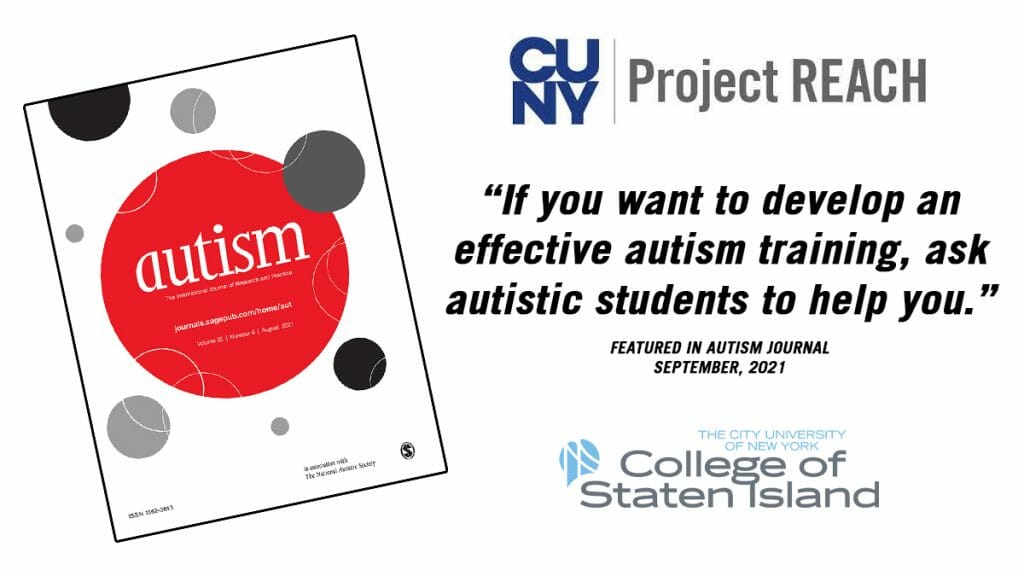
A multi-institution team of professors, along with autistic university students and alumni from the College of Staten Island’s Project REACH (Research and Education on Autism as CUNY’s Hallmark) have published a study that could improve approaches to autism research in the United States and abroad. The paper, which appears in the journal Autism, is the first to experimentally show that autism research is enhanced by collaborating with autistic people. It is also the first to show that autism trainings can lead to reductions in implicit biases toward autism. This is a promising departure from recent studies performed by the University of Texas, Dallas and Sesame Street research associates, whose trainings did not improve implicit bias.
“Ours is the first study to demonstrate improvements in implicit biases toward autism with training, and given that implicit biases may sometimes be more accurate predictors of behaviors than the biases people report, the results of our training evaluations are very promising,” said Kristen Gillespie-Lynch, the study’s principal investigator and a Psychology professor with The Graduate Center, CUNY and College of Staten Island. “The other key innovation is that our study is the first to directly compare a participatory to a non-participatory approach to doing autism research.”
For the study, Gillespie-Lynch and her team developed online trainings to improve autism knowledge and autism stigma among undergraduate students from the United States and Lebanon. One of the trainings used a participatory approach and was developed in collaboration with autistic student co-authors who created videos for the training. The other non-participatory training was developed by non-autistic members of the research team and did not include autistic people’s first-hand perspectives about autism.
Past research has shown that autism trainings can improve explicit misconceptions (negative attitudes that people openly express) about autism. However, past attempts to improve implicit biases (negative associations that people don’t express or are unaware that they hold) about autism have failed. Gillespie-Lynch and colleagues had two research goals: to see if an autism training developed in collaboration with autistic people would have a bigger impact on implicit biases toward autism than a training developed without autistic input, and to see if the autism training developed in collaboration with autistic people would be more effective at improving the types of explicit attitudes (e.g., stigma and knowledge) that past autism trainings have successfully improved.
A pilot comparison of the two trainings revealed that both the participatory and the non-participatory training led to improvements in explicit stigma and knowledge about autism. Both trainings also achieved significant improvements in implicit biases toward autism, as measured by an Implicit Association Test, with the participatory and non-participatory trainings being equally successful in addressing implicit biases. Excitingly, the pilot study provided the first evidence that autism trainings can improve implicit biases. Then, a cross-institutional study conducted at three universities in the U.S. and one in Lebanon showed that the participatory training was more effective than the non-participatory training at improving explicit autism stigma and knowledge.
Autistic co-authors coded feedback about the trainings to help others adapt existing or develop new trainings, and they identified three key recommendations for effective trainings that occurred frequently in feedback: an interpersonal element (e.g., the opportunity to learn from autistic people), accessibility (e.g., more videos and interactive elements), and clarity of information (e.g., reducing extraneous information to highlight key points).
Together, these studies provide empirical support for the benefits of involving autistic people in research about autism. A total of five autistic CUNY students and alumni (each a leader in Project REACH) lent themselves to the research project. Nicholas Tricarico, a graduate of CSI’s Verrazano Honors program, helped develop and evaluate earlier versions of the participatory trainings. Bella Kofner, a CSI graduate student in special education with a focus in mathematics and co-lead of the Project REACH mentorship group, helped develop and evaluate the training. Jin Delos Santos, who graduated with honors in psychology from CUNY’s Hunter College and also co-leads the Project REACH mentorship group, helped evaluate the training. William Pinkava, a CSI political science graduate, and Allison Jordan, a student at CUNY’s Borough of Manhattan Community College and one of the first autistic leaders of CSI’s Project REACH mentorship program, both contributed to the study’s training development.
“It was a wonderful experience of being a part of this amazing research because I gained more knowledge of autism and how people with autism can thrive in society,” said Kofner. “As an autistic person myself, I wanted to bring awareness to others who may not know about autism. Bringing this awareness can allow for change in how others view autism and people with autism in our society.”
“A growing group of researchers around the world has helped spark a sea change in autism research,” said Gillespie-Lynch. “This is leading younger researchers to enter the field knowing that autistic people who are interested in sharing their insights should be recognized as subject experts. We have long believed that the insights of autistic people can make autism research more valid, relevant, and effective for the autistic community. Our study provides empirical support for this belief.”
Gillespie-Lynch and her collaborators are currently preparing the results of a follow-up study demonstrating lasting benefits of a participatory Autism and Universal Design training for faculty, which was developed by a team of eight autistic and seven non-autistic scholars. The training resources from her team’s work are made available through ResearchGate’s open access platform.
Professors, Jennifer Bailey Bisson from Clemson University, Sabine Saade from the American University of Beirut, Ashley Johnson Harrison from the University of Georgia, and Rita Obeid, who received her doctorate from CUNY Graduate Center and is an instructor at Case Western Reserve University, also worked on the paper.
By David Pizzuto















